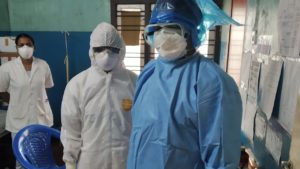
A physician recently described the new ritual of protection that health professionals have been taking on in this pandemic crisis. He told us how he is doing his best to protect his family when he returns home. He takes off his clothes he showers at the entrance then puts on clean clothes. We are used to physicians wearing special outfits that distinguish them as a profession as well as protecting them and their patients; we are familiar with unmistakable surgeons’ complete attire. The coronavirus has turned out to be more formidable than surgical protective garments. We are shocked by the new needs of protection of our health workers when they come home and their unmet needs at work.
From coronavirus let’s go back in time to Leviticus. Preparing for this Shabbat before Passover, I am thinking of this week’s Torah portion, Tzav, with our new urgent need for protection. Every year as I read this text I struggle with the description of sacrifices; yet as we all know, we never reread texts in the same way. What now jumps out for me is the ritual of changing clothes in Leviticus. We read [Leviticus, 8] that God instructs Moses to gather the whole Israelite community at the entrance of Ohel Moed, the Tent of Meeting and let them know that he is about to prepare Aaron and his sons for their priestly role; the priests’ responsibility includes an element of danger. On behalf of the community they are about to enter a holy space and as we know from other accounts [like the death of Aaron’s two sons and the death of Uzzah], close proximity to the sacred requires protective elements. God instructs Moses to first wash the priests then dress them so that they could, on behalf of the people, engage in the offering of the sacrifice. There is a detailed list of these garments made of several layers including protection for the head that Moses carefully puts on them, layer by layer, like a parent dressing a small child, like the physician who upon returning from the hospital showers and put on clean clothes before properly entering the home.
Moses gathers the whole community to witness the ritual in which he, their leader, is responsible to dress the priests and to make the community part of the ritual of protection on its behalf. The enormity of this ritual is visible at the end of the sacrifice when Aaron and his sons are instructed to quarantine themselves: “You shall remain at the entrance of the Tent of Meeting day and night for night for seven days—that you may not die.”
In our time of the coronavirus, rituals of protection include staying at home, washing our hands, keeping physical distance and providing personal protective equipment for medical workers. There is a shortage of this much-needed PPE in most hospitals, not only in New York City but all around our country.
New York Governor Cuomo has been outspoken about this need of medical workers, “We respect them and we love them for what they’re doing. They should have every piece of equipment that they need to do their job. That is the least that we can do. We are all doing everything we can to make that a reality.” The governor is a model of leadership for showing real commitment to our ideal of one-nation-indivisible. We must make sure that all our medical workers get the necessary PPE, for their sake for us, for our future. We hope that we are very far away from the days of sacrifices, and yet recognize that we are always in the Leviticus time of the need to protect those who act on our behalf. Like the Israelites, we expect our leaders to do everything, day and night, and for as long as it is needed, to protect these heroic courageous life-saving workers.